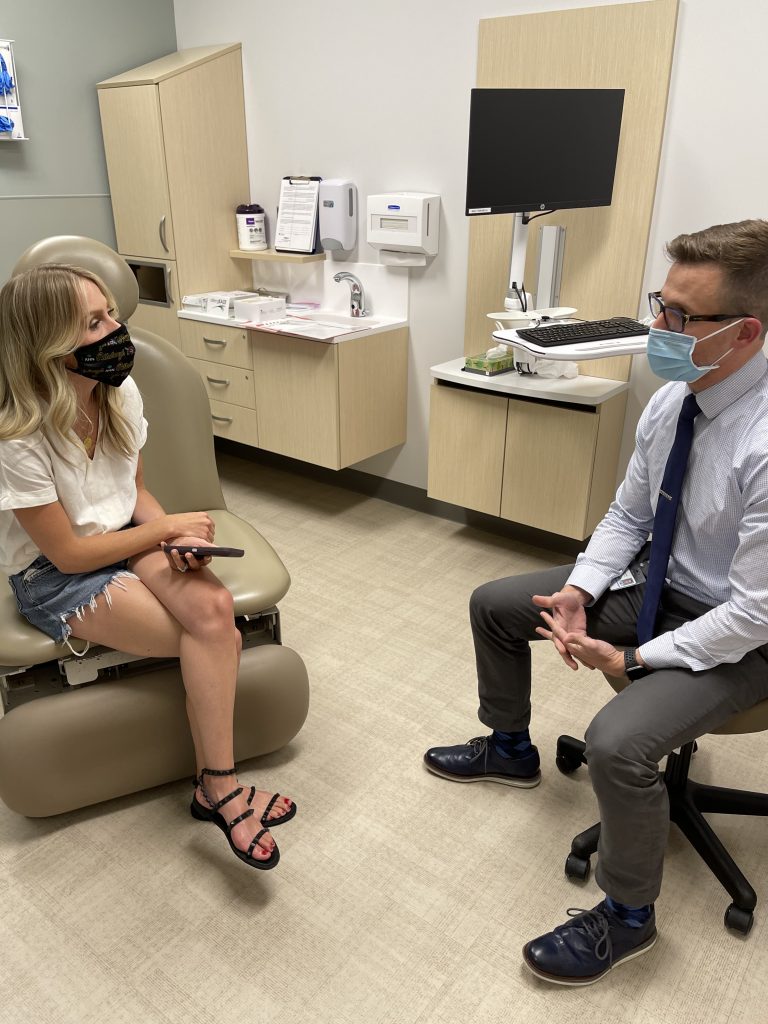
Friends, I can’t tell you how much I enjoyed interviewing Dr. Eddie Mount! He’s so knowledgeable, easy to understand and his new digs at the AHN neighborhood hospital in McCandless are beautiful!

Below are his answers to the skincare questions you submitted. I also listed his favorite drugstore products I shared last week on my Instagram REEL. If you’d like to make an appointment with Dr. Mount, you can reach him at the Cranberry office at (724) 741-3120 and at AGH at (412) 359-3376. You can also call 412-DOCTORS and make an appointment!
Dr. Mount’s favorite drugstore skincare buys:
Cerave face wash
Cerave moisturizer
Neutrogena HydroBoost gel cream
Cerave sunscreen
LaRoche-Posay sunscreen
Cerave Vitamin C serum
Skinceuticals Vitamin C serum (not drugstore but the gold standard and worth it)
Differin retinol
Could Dr. Mount share some tips on dealing with rosacea?!
Moisturize and daily SPF! Choose calming/hydrating face washes or prescription sulfur based washes or over-the-counter, non-foaming/non-medicated face washes (avoid benzoyl peroxide and salicylic acid.) Avoid both natural and artificial fragrance in your facial products. Pro-tip: fragrance is great for our nose but not for our skin. Rosacea prone skin is even more sensitive to these nonessential chemicals. Over-the-counter products with azelaic acid and niacinamide can be helpful. Be careful with retinols. See your dermatologist for further help! Your rosacea may be something else requiring a completely different approach!
How do I deal with body breakouts?
Toss the loofahs, brushes, and sponges and let the soap or wash do the work. If you require something else, use a fresh, clean washcloth. Wash body breakouts with benzoyl peroxide, salicyclic and/or glycolic acid body washes. Dandruff shampoos can be effective for the pityrosporum folliculitis component (what the non derm social media community likes to call “yeast acne.”) Dermatologists often prescribe stronger versions of anti-yeast medications and sometimes oral antimicrobials. Rather than heading to the coffee shop or running errands, try to change out of tight sweaty athletic clothing as soon as possible. Shower after workouts if able.
How can I lessen scarring on my face?
First, make sure the active acne is under control. You can’t get yourself out of a hole if you’re still digging. Scarring correction is difficult without professional, experienced guidance. Seeing a board certified dermatologist, plastic surgeon, or an advanced practice provider or esthetician under the guidance of a medical professional is often your most effective and safest option. Many options from peels, micro needling and laser therapy are available depending on the patient’s needs. Many patients I meet who complain of scarring actually have post inflammatory hyperpigmentation or erythema which are not true scarring and may be addressed differently. Perhaps most importantly, I advise aggressive treatment if someone is starting to scar or is at risk for scarring. Acne is relatively easy to treat in comparison to scarring. It is also covered by insurance medical plans whereas acne scarring treatment is generally not covered and can be very expensive. If you or your child are starting to scar see your dermatologist ASAP to clear things up well before the scarring occurs.
How can I get rid of my sunspots?!
Daily facial moisturizing SPF! Just like acne scarring, it is easier to prevent sun spots than it is to correct them! Retinols, azelaic acid, vitamin c products are great for all skin types. Hydroquinone containing products are often more effective but must be used carefully in the correct strengths and duration depending on skin tone.
What’s the best sunscreen for sensitive skin?
Zinc and titanium based products are probably safer. The chemical sunscreens are more likely to cause contact allergy. The mineral sunscreens also work better across the UV spectrum! Specific brands I would advise trying include Vanicream and CeraVe Hydrating Sunscreen. Try to use facial sunscreen on your face and save the “regular” sunscreen for the rest of the body. The term “sensitive” on labels has no FDA defined standard. Any company can label their original formulation “sensitive.” It takes doing your homework on ingredient labels and discussing with your dermatologist to know what is truly least likely to cause skin sensitivity issues. Remember the most effective sunscreen is the one you’ll use the most consistently rather than the one I tell you to use but it only sits in your drawer or cabinet! Just make sure the SPF is at least 3, but, ideally, 50 at the beach, lake, or pool.
**This blog post was sponsored by Allegheny Health Network and part of my partnership with AHN’s Women’s Health.**